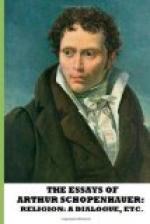We find accordingly that what is described as the great advance from Theism to Pantheism, if looked at seriously, and not simply as a masked negation of the sort indicated above, is a transition from what is unproved and hardly conceivable to what is absolutely absurd. For however obscure, however loose or confused may be the idea which we connect with the word “God,” there are two predicates which are inseparable from it, the highest power and the highest wisdom. It is absolutely absurd to think that a being endowed with these qualities should have put himself into the position described above. Theism, on the other hand, is something which is merely unproved; and if it is difficult to look upon the infinite world as the work of a personal, and therefore individual, Being, the like of which we know only from our experience of the animal world, it is nevertheless not an absolutely absurd idea. That a Being, at once almighty and all-good, should create a world of torment is always conceivable; even though we do not know why he does so; and accordingly we find that when people ascribe the height of goodness to this Being, they set up the inscrutable nature of his wisdom as the refuge by which the doctrine escapes the charge of absurdity. Pantheism, however, assumes that the creative God is himself the world of infinite torment, and, in this little world alone, dies every second, and that entirely of his own will; which is absurd. It would be much more correct to identify the world with the devil, as the venerable author of the Deutsche Theologie has, in fact, done in a passage of his immortal work, where he says, “Wherefore the evil spirit and nature are one, and where nature is not overcome, neither is the evil adversary overcome.”
It is manifest that the Pantheists give the Sansara the name of God. The same name is given by the Mystics to the Nirvana. The latter, however, state more about the Nirvana than they know, which is not done by the Buddhists, whose Nirvana is accordingly a relative nothing. It is only Jews, Christians, and Mohammedans who give its proper and correct meaning to the word “God.”
The expression, often heard now-a-days, “the world is an end-in-itself,” leaves it uncertain whether Pantheism or a simple Fatalism is to be taken as the explanation of it. But, whichever it be, the expression looks upon the world from a physical point of view only, and leaves out of sight its moral significance, because you cannot assume a moral significance without presenting the world as means to a higher end. The notion that the world has a physical but not a moral meaning, is the most mischievous error sprung from the greatest mental perversity.




